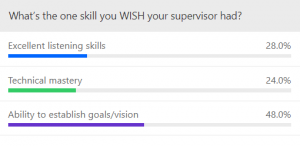The workplace can be tough. Making headway with managers can seem as hard as climbing Kilimanjaro. Naysayers lurk around the corner, too likely to denigrate your ideas, and career opportunities can seem few and far between.
During Wednesday’s NextGen session entitled “Communicating Your Value in the Workplace,” GovLoop offered point-by-point guidance for people trying to overcome those challenges and unlock what they can offer their agencies.
Love Rutledge, a federal employee and podcast host, said that first and foremost, employees need to understand their environments — “There’s always a backdrop of political drama,” she said — and figure out where their supervisors are in the agency’s food chain.
People need to surround themselves with creative thinkers and workplace producers and be willing to do less desirable tasks at times. That doesn’t mean cleaning out the office refrigerator every week; it simply means taking on substantive jobs that seem less interesting.
Looking for a how-to roadmap? Here’s what Rutledge had to say, as well as how attendees answered our poll questions about their work environments.
Before Pitching an Idea:
- Be sure to articulate the problem you want to solve and the skills you (specifically) offer
- Ensure that you understand all steps involved in implementation
- Talk to naysayers in advance to preempt their criticisms — since “every organization has its group of curmudgeons” willing to itemize past failures
- Come to the discussion with a bit of humility (and patience)
- Ensure that what you’re pitching ties into the organization’s overall mission
- Secure allies of your idea before the meeting
Take on a New Role:
- Realize that what made you successful at one level may not be as crucial at a higher rank (where “soft skills” rather than Excel know-how, for instance, are more important)
- Ask senior leaders about their roads to success (most people are happy to talk about themselves)
- Develop organic mentoring relationships with people “who’ve walked a path you admire”
- Let people know you’re ready to do more

Talk about Growth Areas:
- Find out what your supervisor thinks your developmental needs are, but talk outside the rigid annual review process
- Enter the conversation with a sense of curiosity
- Create an individual development plan laying out opportunities you’re interested in and their costs/timelines
- Be able to tie your educational interests with the agency’s mission
- Understand that training can be as simple as reading a book or talking to an expert

Interacting with Peers Is Critical Because It Can:
- Help you understand whether you have accurate perceptions of your manager
- Make you more visible, which is useful when aiming for career advancement
- Allow you to use lateral connections to get ideas across when higher-ups don’t help
Rutledge said that employees struggling to get noticed in government should take comfort: It usually takes three, four, five attempts before ideas break through. After all, she commented, “The bureaucracies that we work in are known for rejecting good ideas.”
Photo by JESHOOTS.COM on Unsplash






Leave a Reply
You must be logged in to post a comment.